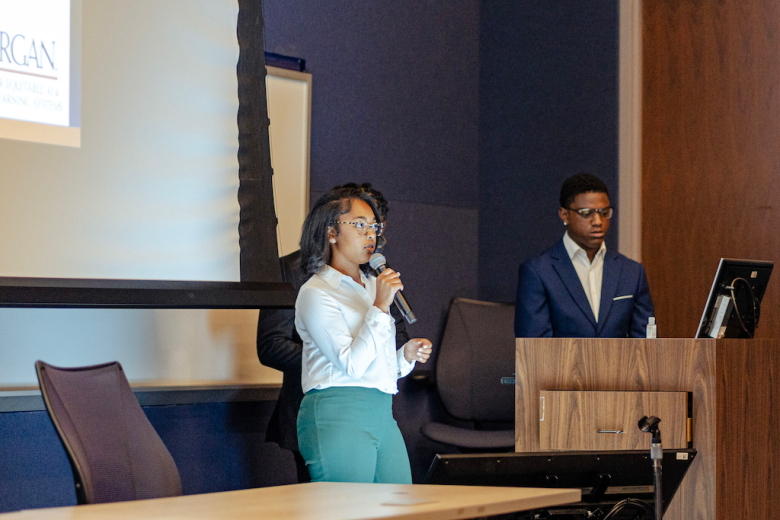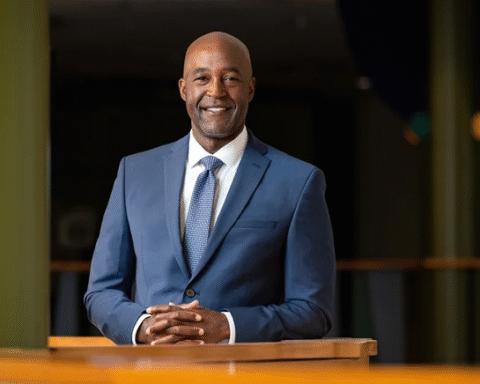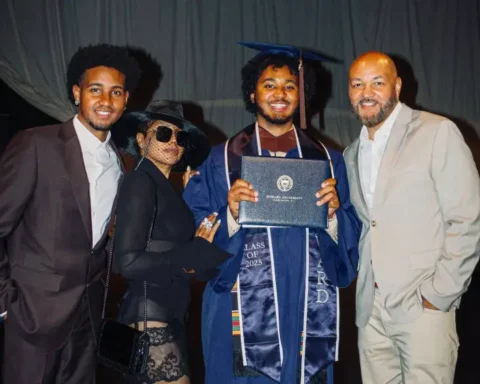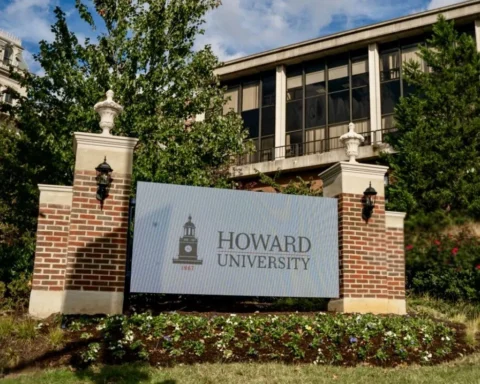With executive orders to dismantle the Department of Education, and micromanage diversity and inclusion across federal programs and academic curriculums, the future of equity in academia is at a standstill. Thus, historically Black colleges and universities (HBCUs) nationwide are adamant to uphold the future of diversity in digital advancement, particularly through leading in artificial intelligence (AI).
“When HBCUs are at the forefront, when we are the breeding ground of innovation – out of necessity, too – we do it for everyone. It’s a humanity first effort all the time within HBCUs,” said Dr. Muhsinah Morris, Metaversity director at Morehouse College in Atlanta.
Morehouse College’s innovative Metaversity program aims to immerse students in academic learning and engagement through a virtual reality experience based on real or hypothetical occurrences. Morris emphasized the importance of HBCUs in advancing digital breakthroughs, noting the historic roots of African American culture in society.
“Black people are the culture, we define the culture,” she said. “So why shouldn’t we design the future?”
As historically Black colleges and universities have long served as incubators of innovation and excellence, institutions like Morehouse, Maryland’s Morgan State University and Northwest D.C.’s Howard University are continuing the legacy with trailblazing efforts to increase AI literacy in communities of color.
By leveraging educational training, hands-on exposure, and a continued commitment to develop forward thinkers, these respective institutions, and educators like Morgan State’s Gabriella Waters, aim to tackle digital inequity and redefine the future of Black scholarship in technology.
“This technology is an opportunity. It presents challenges, just like any other opportunity, but it presents a lot of ways for us to make a large impact that we really need to, that’ll be meaningful and that will have so much potential for generations to come,” said Waters, director of operations at the Center for Equitable AI and Machine Learning Systems (CEAMLS). “But we have to be involved, and we have to drive those changes.”
For Morehouse College, piloting artificial intelligence in academics began in spring of 2021, when Dr. Morris and three other professors spearheaded immersive virtual reality as a teaching modality amid the anomalies of distant learning during COVID-19.
What initially started out as a pilot project to ensure matriculation soon became the blueprint for the nation’s first “metaversity” virtual reality experience, now followed by more than 120 existing “Metaverses” in historically Black institutions across the nation.
Now, through the collaborative efforts of VictoryXR and OpenAI, Morehouse is continuing to forge paths in technology education by implementing AI teaching assistants and textbook assistance in multiple disciplines.
“Innovation is the only way that I can see that you overcome 20 generations of inequity,” Morris explained. “If we don’t continue to innovate and springboard off of the thing that is available to us right now, we will basically keep ourselves down as a community.”
Virtual 3D spatial avatars have been made available 24/7 to bring professor-created content to life, offering personalized learning support that features two-way oral conversations– including in a student’s native language– and the use of three-dimensional models to ensure an all-inclusive learning experience.
While the novel technique is still in the developing stages, and thus far only implemented in “several small courses,” Morris said the program has already shown promising feedback.
Moreover, according to Axios, the educator’s hope is to have an AI assistant for every professor in the next three to five years.
“We have gotten to a place where technology is moving faster in the last two years than it has in the last 24 years,” Morris told The Informer. “[It’s] necessary for Morehouse, for me, to lead that effort and not ask for a place at the table, but to build the table the way that they wanted to see it.”
AI Literacy to Propel Institutions, Future Leaders Across the DMV
Howard University and Morgan State University are also working to shape digital equity by fostering the space for AI-based research projects and collaborations to thrive.
Like Morris, Waters emphasized that the rapid increase of AI and how “it’s adopted us” as a society exemplifies the necessity to dive deeper into its various applications.
The theoretical researcher told The Informer her own studies are driven in a desire to explore the ways that human and digital interactions can meet in the middle to “bolster” one another – a curiosity she aims to similarly instill in her students.
“I’d like to see our students be very curious about what they can do and how they can change systems that are broken, how they can model what might happen using the tools and the technology to be better stewards of this world,” said Waters, “so that they leave it in a much better condition than they found it.”
While Morgan’s main campus is in Baltimore, CEAMLS is a Bowie-based institution that drives Waters’ mission by exposing students to a learning management system (LMS) that challenges users to better understand the intricacies of building algorithms.
Additionally, CEAMLS intends to shape AI literacy for younger demographics with a K-12 curriculum that teaches children the ethics, limitations, and tools of engaging in artificial intelligence.
“This is the world that they’re going to live in, and it is fully infused with this technology,” Waters said. “Early and often is the best way to do this.”
Meanwhile, at Howard University, the inaugural President’s Artificial Intelligence Advisory Council (AIAC) – established in June 2024 – aims to support a future where humanity and technological advancement coincide, starting with strengthening AI systems in institutions of learning.
“We’re seeing [AI integration] across the university, and we’re seeing this is a student project, and we just want to foster that learning so that they can be leaders in these domains,” said Dr. Talitha Washington, co-chair of the AIAC.
By expanding on current implementations of artificial intelligence, Washington says the hope is to institute campus wide developments that’ll improve the school both academically and operationally, such as financial aid assistance, enrollment management and other student resources.
In the meantime, the university champions AI literacy by offering educational events and training sessions to individuals throughout the DMV region. Washington mentioned that she personally hosted two symposiums on envisioning interdisciplinary AI education last summer; while on March 17, the university held its Howard University Robotics & AI Community Outreach Program to provide 500 pre-college and collegiate students with a first-hand class in AI and robotic technologies.
“We can think of artificial intelligence in two ways: the application of it, where we apply artificial intelligence tools to achieve some sort of goal, or, on the other hand…who’s developing the technology. I see Howard playing a role in both,” Washington said.
Like Howard, Morgan State welcomes collaborations like the upcoming National Symposium on Equitable AI held April 5-6, and the 10-week interdisciplinary Summer AI Research Institute, where undergraduates can learn and practice the fundamentals of AI.
Waters said this year’s symposium introduces a global outlook on the use of the technology, with participation from speakers at Oxford University and in Canada.
“AI doesn’t have borders. These tools are permeating through the ecosystem in every way,” Waters told The Informer. “AI literacy is a part of everything that we’re doing, and going forward, that’s just going to grow as the technology continues to proliferate.”
Leveraging AI Beyond the Classroom
Further, Waters said enhancing AI literacy for marginalized groups could not only reshape systematic disenfranchisement, but also be a call to leverage AI to combat other racial disparities, such as poverty, food scarcity, homelessness and environmental injustice.
Hence, Morgan State’s strong stance in technology stands to fuel the next generation of problem solvers.
“There are people who have more money than anybody can ever dream of, and the world’s problems still exist,” Waters pleaded. “I want to see our students actually start to solve those problems.”
Similarly, Morris hopes that Morehouse will continue to inspire others to explore artificial intelligence deeper within the digital divide. She noted that, with increased communal engagement, all creators can use the Metaverse model to generate paths to economic mobility, financial stability, and potentially “build something bigger” for themselves and communities as a whole.
“We’re hoping that we are able to provide a blueprint that allows people to understand how to use this in the right way and integrate in the right way, and that they are not afraid to do it,” Morris explained.
The affectionately coined “Chief Science Lady” of Morgan State University gave a nod to other Black institutions leading in AI education, while also acknowledging that not all HBCUs have the equitable resources to excel in tech development. With the uncertainties of what’s to come, Waters said she hopes to see HBCUs seize this opportunity to drive a collaborative mission towards digital equity.
“The White House initiative on HBCUs no longer exists, so this is a critical moment where we…have to lean on each other a lot more,” Waters emphasized. “This could be an opportunity for us to just be a support network going forward.”





